

Marketing yourself. The job market for researchers. The job market for researchers The Job Market for Researchers A PhD is now the established entry qualification for a career in academia but, whilst this may seem to be the most obvious career route, only a minority of doctoral graduates pursue this option.
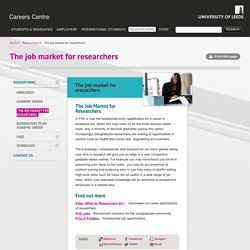
Increasingly, postgraduate researchers are looking at opportunities in sectors such as health and social care, engineering and business. The knowledge, competencies and experiences you have gained during your time in research will give you an edge in a very competitive graduate labour market. What employers look for. Recruiting researchers: survey of employer practice, Vitae 2009 surveyed 104 employers and found that most (73%) would welcome more applications from doctoral graduates and that nearly a third (31%) are already actively targeting doctoral graduates.
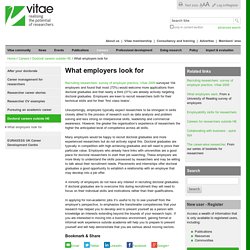
Employers are keen to recruit researchers both for their technical skills and for their ‘first class brains’. Unsurprisingly, employers typically expect researchers to be strongest in skills closely allied to the process of research such as data analysis and problem solving and less strong on interpersonal skills, leadership and commercial awareness. However, the greater the organisation’s experience of researchers the higher the anticipated level of competence across all skills. Downloads. Employability: what do doctoral graduates offer employers? In a modern knowledge-based economy, highly educated and skilled people are in great demand.
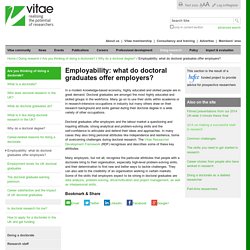
Doctoral graduates are amongst the most highly educated and skilled groups in the workforce. Many go on to use their skills within academia or in research-intensive occupations in industry but many others draw on their research background and skills gained during their doctoral degree in a wide variety of other occupations. Doctoral graduates offer employers and the labour market a questioning and inquiring attitude, strong analytical and problem-solving skills and the self-confidence to articulate and defend their ideas and approaches. In many cases they also bring personal attributes like independence and resilience, borne of overcoming challenges during doctoral research. The Vitae Researcher Development Framework (RDF) recognises and describes some of these key attributes. Vitae researchers skills. Downloads. Being Creative In Your Job Search - Careers Advice. As the saying goes, “there’s more than one way to skin a cat!”
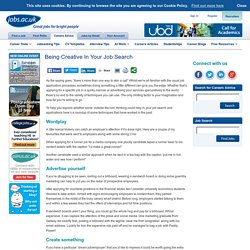
Whilst we’re all familiar with the usual job application processes, sometimes doing something a little different can give you the edge. Whether that’s applying for a specific job in a quirky manner or advertising your services speculatively to the world, there’s no end to the variety of techniques you can use. The only limiting factor is your imagination and how far you’re willing to go. To help you explore whether some ‘outside the box’ thinking could help in your job search and applications here’s a roundup of some techniques that have worked in the past. Wordplay A little lexical trickery can catch an employer’s attention if it’s done right. 5 Ways To Use Social Media To Get Ahead Of The Competition - Careers Advice. Downloads.
Building Academic Job Applications: A Quick & Practical Guide for Early Career Researchers. This resource is targeted at those at an early stage of their academic career.
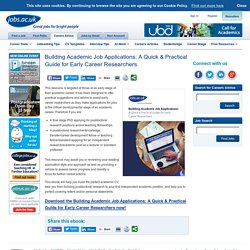
It has been designed to offer practical suggestions and advice to assist early career researchers as they make applications for jobs at the critical developmental stage of an academic career. Therefore if you are: A final stage PhD applying for postdoctoral research positions and/or teaching fellowships.A postdoctoral researcher/knowledge transfer/career development fellow or teaching fellow/assistant applying for an independent research/academic post as a lecturer or assistant professor.
Building academic job applications a quick practical guide for early career researchers. Acing the Online Application Form - Careers Advice. If you are applying for a job at a Higher Education Institution or research body, you will almost certainly have to complete a lengthy online application form.
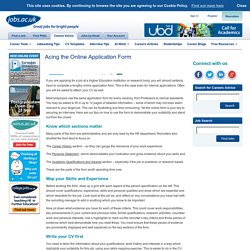
This is the case even for internal applications. Often you will be asked to attach your CV as well. Most employers use the same application form for every vacancy, from Professors to clerical assistants. Effective cover letters - quick tips. Consider your covering letter as the icing on the cake that is your application.
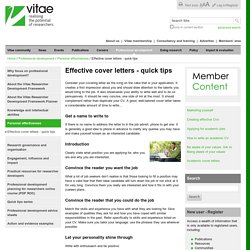
It creates a first impression about you and should draw attention to the talents you would bring to the job. It also showcases your ability to write well and to do so persuasively. It should be very concise, one side of A4 at the most. It should complement rather than duplicate your CV. Academic cover letters. It’s also important to understand what will and won’t be acceptable to the organisation you’re hoping to join.
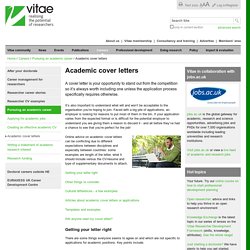
Faced with a big pile of applications, an employer is looking for reasons to put most of them in the bin. If your application varies from the expected format or is difficult for the potential employer to understand you are giving them a reason to discard it - and all before they’ve had a chance to see that you’re perfect for the job! Online advice on academic cover letters can be conflicting due to different expectations between disciplines and especially between countries: some examples are length of the letter, what it should include versus the CV/resume and type of supplementary documents to attach. Getting your letter right. How to write a cover letter for research jobs.
Presenting your research.